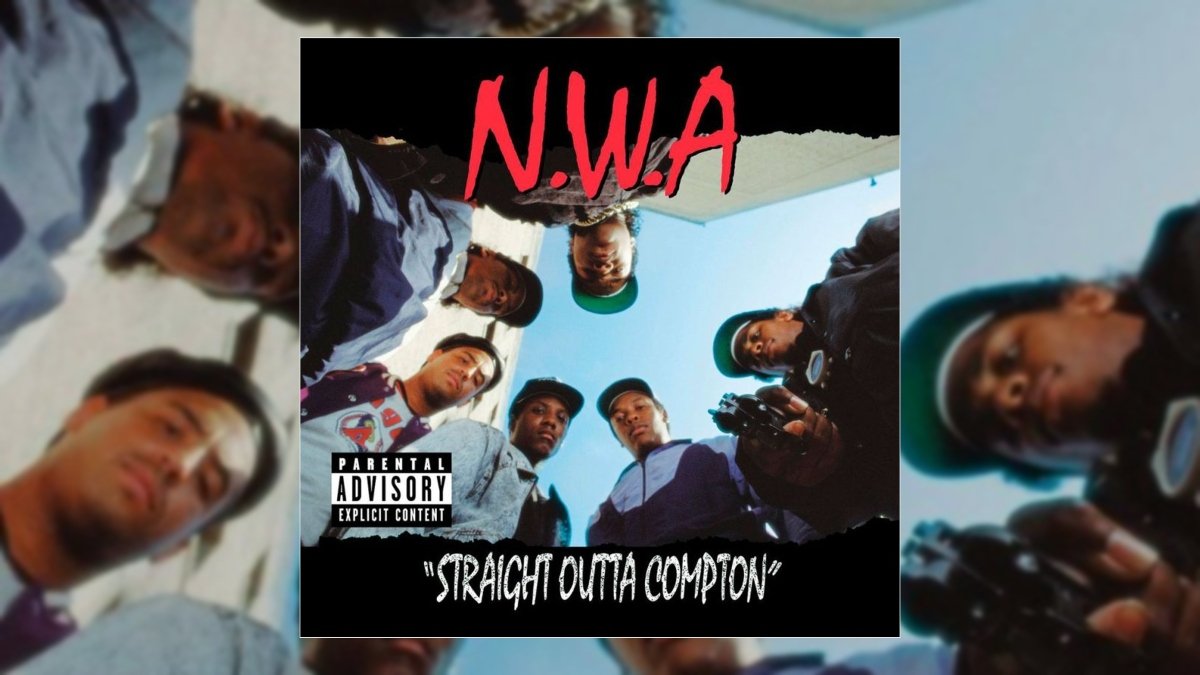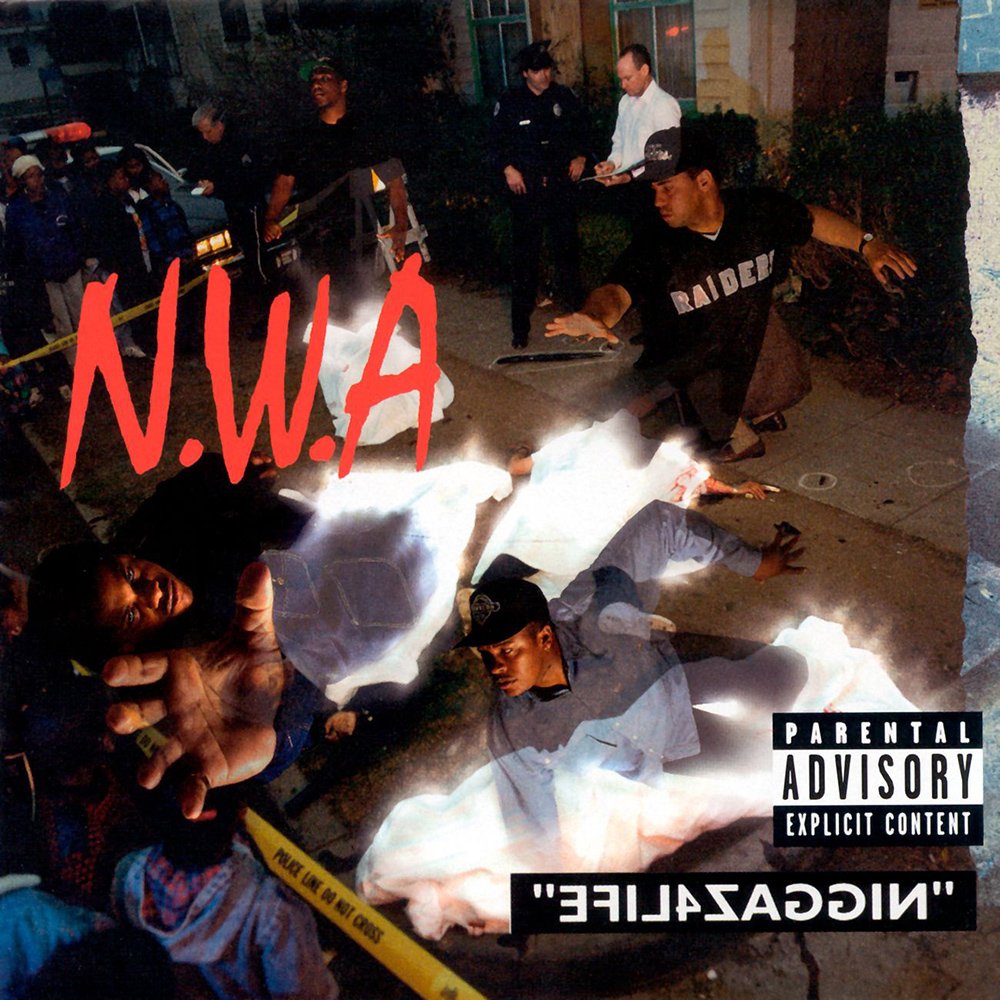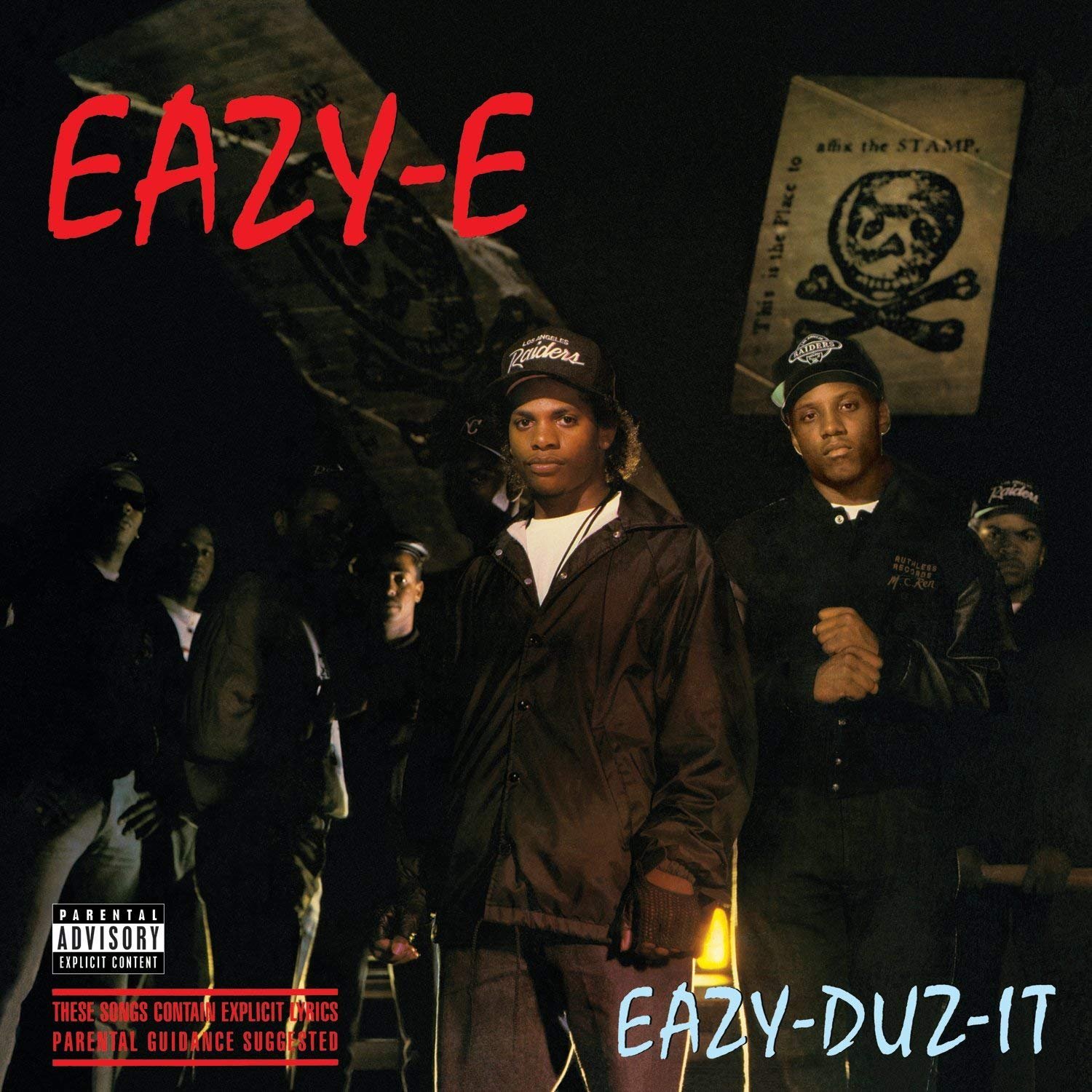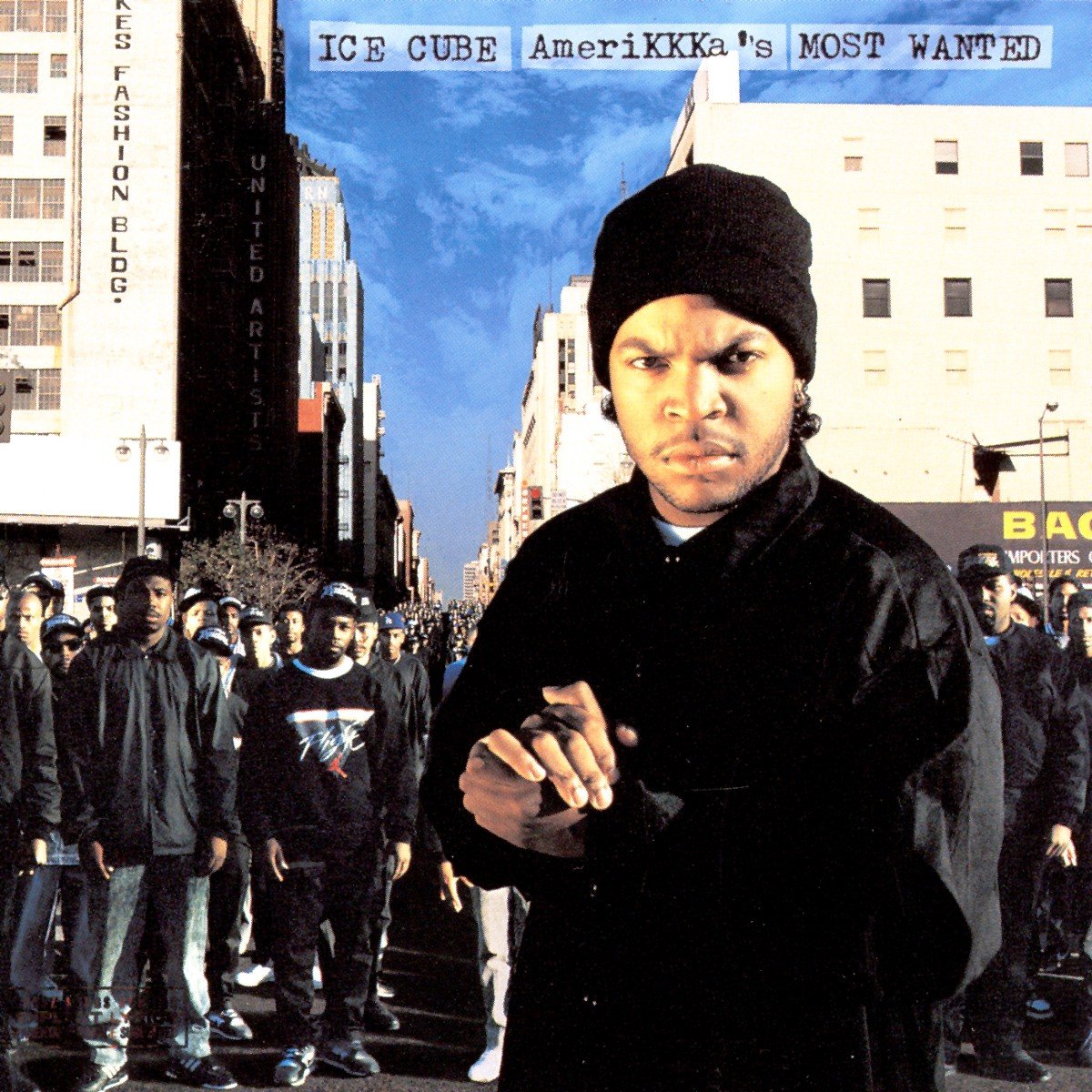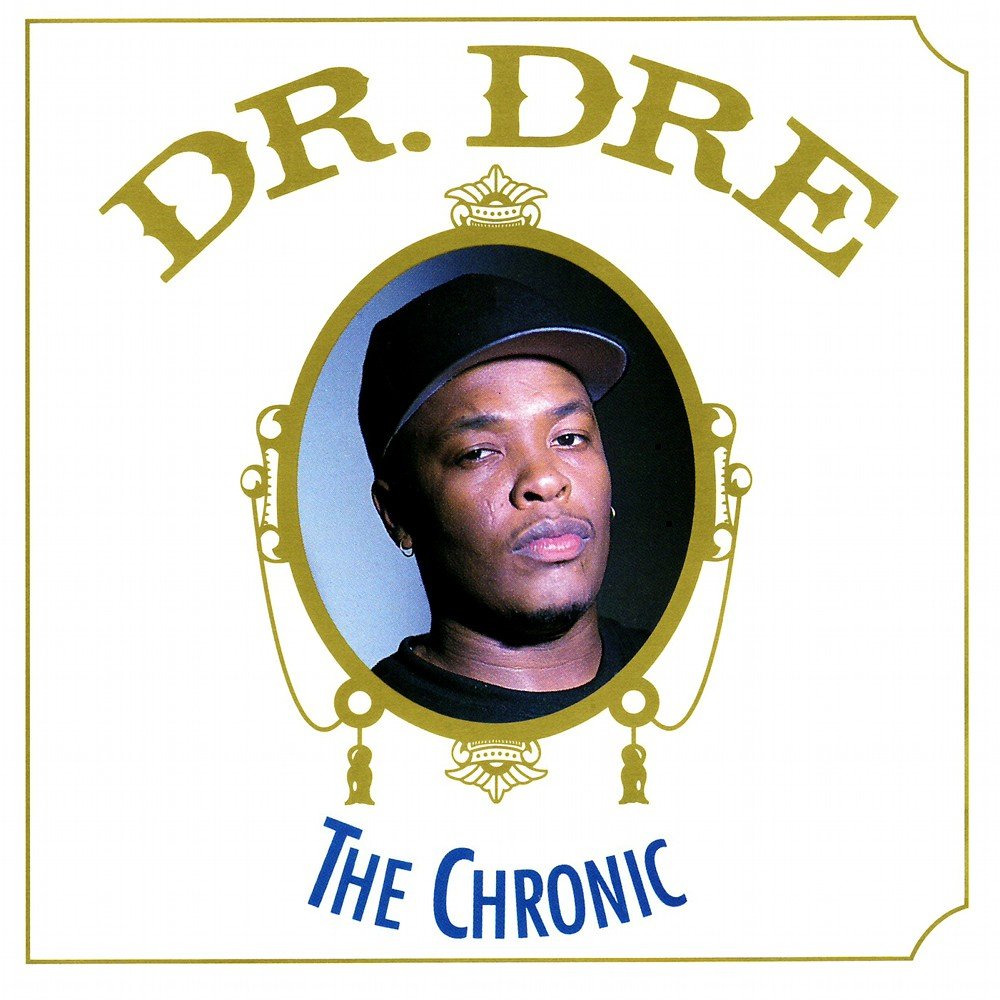Happy 35th Anniversary to N.W.A’s official debut album Straight Outta Compton, originally released August 8, 1988.
Straight Outta Compton is one of the rare albums that changed the direction of hip-hop music. As a group, the history of N.W.A (aka N***az With Attitude) has been well-documented, subject to countless interviews, articles, books, feature films, and documentaries. They are probably one of the most studied rap groups ever, and Straight Outta Compton, released 35 years ago, is the central reason for their fame.
It’s not accurate to say that N.W.A created “gangsta” rap. Its origins date back to the mid-1980s with artists like Philadelphia’s Schoolly-D and fellow Los Angeles rapper Ice-T, among others. But it is accurate to say that with Straight Outta Compton, N.W.A took gangsta rap and sharpened it into a weapon. Or more accurately, turned it into a heavy cudgel to beat their critics into submission.
In retrospect, N.W.A’s lineup was a murderer’s row of creative rappers, producers, DJs, and innovators. Made up of Eric “Eazy-E” Wright, Andre “Dr. Dre” Young, O’Shea “Ice Cube” Jackson, Lorenzo “MC Ren” Patterson, Antoine “DJ Yella” Carraby, and Mik “Arabian Prince” Lezan. Of those six, Eazy-E was the certified gangsta. While other members of the group were known to get into a little trouble, Eazy was a dope dealer that took his ill-gotten gains and funneled it into a record label, Ruthless Records, so that he could release music recorded by himself and his friends.
By all accounts, none of the members of the group truly realized the impact that Straight Outta Compton would have. Dre has said it took him only a few days to put together all the beats for the album. Studio sessions were fueled by liquor and weed. But what emerged was perhaps the most influential hip-hop album ever recorded. It started Dr. Dre down the path toward becoming an influential industry mogul and hip-hop’s most recognizable producer. It helped make Ice Cube the powerful pop culture presence he is today. And it got the group inducted into the Rock & Roll Hall of Fame back in 2015.
Back when Straight Outta Compton was first released, N.W.A began calling themselves “The World’s Most Dangerous Group.” Whether or not that’s completely legitimate, it gets to the heart of N.W.A’s appeal and what made them so different. In 2023, rap music is ridiculously mainstream, but 35 years ago, most people didn’t know what to make of it. Hip-Hop was dismissed as noise created by guys who didn’t know how to play instruments. And into that environment stepped six young Black men, decked out in all black, cursing, calling themselves “n***as,” brandishing firearms, and showing a total lack of respect for any of the traditional institutions of the day. It made their music seem threatening. Uncomfortable. Dangerous. It’s this sense of danger that’s sorely missing in the rap music of today.
Straight Outta Compton actually isn’t the group’s first album. That would be N.W.A and The Posse9 (1987), a compilation album released by Macola Records. By some accounts, N.W.A and The Posse is a bootleg; the group originally released a three-song EP and Macola Records appended some material from members of the group and its affiliates and sold it as a full-length. Regardless, Straight Outta Compton is the first album where the group really began to define itself and determine what would be its musical direction and guiding principles.
Straight Outta Compton opens with a three-song sequence that’s among the best to ever appear on a hip-hop LP. The group leads things off with the title track, which slams listeners with the force of a guided missile. Over the space of three verses, Cube, Ren, and Eazy all perfectly display their styles and personalities over the now ubiquitous slowed-down drum break from The Winstons’ “Amen, Brother” and the towering horns sampled by Dre. The track crackles with raucous energy, featuring piercing shrieks and furious scratches, making it sound unlike anything that was being released at the time.
Listen to the Album:
“Fuck the Police” is N.W.A’s most notorious song, with Cube, Ren, and Eazy matching the brazenness of the song’s title with the brashness of their verses. Rappers had recorded songs about their wariness of the police department, but few had released material as bold as “Fuck the Police.” The track represents the frustration and anger toward the Los Angeles Police Department that had been building in the Black community throughout the City of Angels.
This ill will had been present since at least the 1960s, which, by the late 1980s, in the midst of the reign of Daryl Gates and the rise of LAPD programs like CRASH, was nearing critical mass. In a documentary about the song’s creation by Noisey, Cube states that he was inspired to write the song after it became apparent that the LAPD’s war on gangs was ostensibly a war on young Black men. He saw the song as a way to explosively release this tension.
In the Dr. Dre/Jimmy Iovine documentary The Defiant Ones, the group further details the origins of the song. Dre said he passed on the song the first time Cube showed him the lyrics, but later relented after he and Eazy were pulled over by the LAPD a few days later. It seems the two had been driving around Torrance (the city where the crew recorded Straight Outta Compton) firing very realistic looking paint-guns at bystanders at local bus stops and at cars on the highway. But no matter the true source of its inspiration, the result is an anthem against police brutality and racial profiling that feels as relevant and immediate today as it did when it was released 35 years ago.
With “Fuck the Police,” N.W.A spoke a language that members of the Black population throughout the United States and across the globe could relate to. Despite the vocal and visible pushback from police departments across the country and, famously, the FBI, many other groups both in Los Angeles and elsewhere began sharing similar sentiments on their albums.
Though “Fuck the Police” remains N.W.A’s most controversial recording, “Gangsta Gangsta” is really their definitive song. As the album’s first single, Cube does an excellent job at describing life on the streets of Compton and South Central Los Angeles. Over a sample of Steve Arrington’s “Weak In the Knees,” he paints a picture of the nights and weekends when young men like himself and his friends travel the avenues and neighborhoods where most don’t dare to go, looking to start a little trouble. After three verses, Cube hands things over to Eazy-E, who describes gambling, fucking, and killing without a lick of remorse.
“Gangsta Gangsta” gets to the heart of what N.W.A is about: detailing life on the streets of Los Angeles, with all of its uncomfortable realities, in a matter of fact manner. And it was this language the made the group so popular to the denizens of not only Compton, but also places like Detroit, Michigan or Gary, Indiana. Their experiences may have seemed specific, but they were more broadly relatable to a growing population of the United States.
“Dopeman” is similarly illustrative of what made N.W.A so distinctive. The song is a raw and abrasive treatise on the effects of drugs on the Black community during the late 1980s. Like “Gangsta Gangsta,” the song is fronted by Cube and features a final verse from Eazy. Neither is particularly sympathetic to those who fall victim to the ravages of crack cocaine (Cube famously states, “If you smoke ’caine, you’re a stupid motherfucka”), but both paint a gritty a realistic picture of how crack ruins the lives of those who use it, and how the dealers themselves profit without any remorse. Musically, the song features pounding drums, coarse scratches, and one of the earliest uses of the Ohio Players’ “Funky Worm,” which sounds itchy and claustrophobic here.
It is notable how rare it was for all of the group’s rapping members to appear on the same track at the same time. The album’s first two songs featured Cube, Ren, and Eazy rhyming together, with Dre staying behind the boards. He joins the trio on the mic for “Parental Discretion is Advised,” the album’s “posse cut.” The song also features the sole appearance of Tracy “The D.O.C.” Curry on Straight Outta Compton.
The D.O.C. was originally a member of the Texas-based Fila Fresh Crew, a group that had been friends with members of N.W.A. for awhile, and three of their songs had appeared on N.W.A and the Posse. The group broke up and The D.O.C. entered the N.W.A fold, writing rhymes for both Dre and Eazy. The D.O.C. always considered himself a lyricist first and foremost, and formally introduces himself on the opening verse of “Parental Discretion,” prepping the audience for his forthcoming career. “I know The D.O.C. makes you want to take a Valium,” he raps. “So buy a bucket cause upcoming is my album / And for the record, meaning my record, check it / Listen to the single and you'll be like, ‘Yo, I gotta get it.’”
Enjoying this article? Click/tap on the album covers to explore more about N.W.A and their founding members:
Overall, “Parental Discretion” is one of the more underrated songs on Straight Outta Compton, as it features some of the best lyrical performances by the members of the group. Dre sounds downright inspired, rapping, “Lyrics for the adults, children have been barred /And scarred from listening to something so motherfucking hard! / Dope, pumping that's so my shit will never falter / Yo, it’s Dre so fuck the ‘Mind of Minolta.’” Cube has the track’s best verse, kicking lines like, “Driving your ass with the flow of the tongue / You hung yourself shortly after knowledge was brung / To your attention, by the hardest motherfucking artist / That is known for lynching any sucker in a minute / Stagger ’em all when I start flowing like Niagara Falls.”
Some tracks on Straight Outta Compton harken back to rap’s earliest days. Songs like “Compton’s In the House” and “Something Like That” feature a minimalist aesthetic that is evocative of early records by Run-DMC. Ren and Dre share lyrical duties, passing the mic back and forth, rhyming in tandem, and employing early ’80s-esque routines. “Something Like That” is the better and livelier of the two entries, as Ren and Dre display a level of self-assuredness over a sample of Steve Miller’s “Take the Money and Run.”
Each rapping member of N.W.A gets their own time to shine. Eazy-E’s “8-Ball,” his dedication to cruising the streets of Compton drunk on Olde English 800 malt liquor, first appeared on the crew’s initial 12” on Macola records. It appears here in slightly “remixed” form, with the biggest difference being that, unlike the 12” version, it’s uncensored. The track features the blending of the boisterous humor and blasé violence that would become his trademark. Eazy may have been a legit gangsta, but he was also a funny one, nonchalantly proclaiming, “40 ounce in my lap and it’s freezing my balls.”
Dre assumes solo rapping duties on “Express Yourself,” the album’s most accessible track and second single. Dre samples the Charles Wright and 103rd St. Watts Band song of the same name, expounding on the importance of rappers freely expressing themselves on record. He stresses the importance of remaining true to oneself when recording and staying grounded. Though “Express Yourself” does not feature Dre’s best lyrical performance, it did establish that he was able to carry a song on his own.
Cube’s solo contribution is “I Ain’t Tha 1,” his laid-back screed against women who may be trying to get over on him. He explains in intricate detail how he will not be played or used as an ATM by shady women. Cube does his thing with skill, even if the subject matter hasn’t aged as well. It is notable that Cube doesn’t utter the word “bitch” once on “I Ain’t Tha 1,” though he more than makes up for it on “Bitch Iz a Bitch,” a bonus track on later pressings of the album.
MC Ren’s importance to Straight Outta Compton and N.W.A in general is often overlooked, especially in recent times. After the release of the Straight Outta Compton biopic, Ren tweeted “True fans know my role in the group as far as lyrics are concerned, don't let the movie fool you about my contribution to the group,” implying that his role in the group and their albums went beyond what was captured on screen. Ren is a cool and consistent lyrical force throughout Straight Outta Compton, injecting the album with heavy doses of raw power.
Ren is the only member of N.W.A to receive two solo cuts on the project, allowing him to demonstrate his prowess and varied verbal stylings. First is the slower paced “If It Ain’t Ruff,” featuring Ren executing a relentless flow over a guitar loop from Average White Band’s “A Star in the Ghetto.” He raps, “You know the color, the villain’s in black / Always down to make noise, and attack / So you better get back unless you wanna come with it / And make your face like a target and close your eyes when I hit it.” Meanwhile, “Quiet On Tha Set” is a faster-paced breakbeat-based track, with Ren descending onto the song like a whirlwind. “I don't take no shorts while I’m constructing the ground,” he raps. “That makes y'all move around to my hell of a sound.”
On the surface, “Something 2 Dance 2” is the album’s oddity, an unabashed club track devoid of any sort of gangsta imagery. Truthfully, it fits right in with not only the group’s history, but also the foundation of the Los Angeles hip-hop scene. The song features the album’s only contribution from the Arabian Prince. Arabian Prince had been recording electro-fueled hip-hip since the mid-’80s and had linked up with N.W.A during the group’s earliest days. “Panic Zone,” which also appeared on that initial Macola 12”, was an Arabian Prince solo cut.
As an apt album closer, “Something 2 Dance 2” serves as a respite from Straight Outta Compton’s relentlessly aggressive content. Over a keyboard loop from D-Train’s “You’re the One,” Arabian Prince, Dre, and Eazy-E trade lines, rapping about keeping things grooving and people on the dance floor. It provides a view into the chapter of the Los Angeles hip-hop scene that was soon coming to an end, hastened by this very project.
Straight Outta Compton spawned a surge in the West Coast sound, both in Southern and Northern California. Artists from throughout the country and around the world have continued to draw on the album consistently as a source of inspiration. It’s hard to imagine the success of rappers like 2Pac, Migos, Pusha T or Kendrick Lamar without N.W.A to lead the way.
N.W.A never set out to be a “revolutionary” group. In fact, I’m pretty sure if you time-traveled back to 1988 and told Eazy-E and Dr. Dre that N.W.A was revolutionary, they probably would have laughed in your face. But the group was revolutionary in their own subversive way. Their music wasn’t always pretty, and it was often extremely antagonistic. However, it fundamentally changed the way hip-hop music was recorded and received. It showed that rappers could go completely against the grain of what was considered acceptable, and still succeed being themselves.
LISTEN:
Editor's note: this anniversary tribute was originally published in 2018 and has since been edited for accuracy and timeliness.

